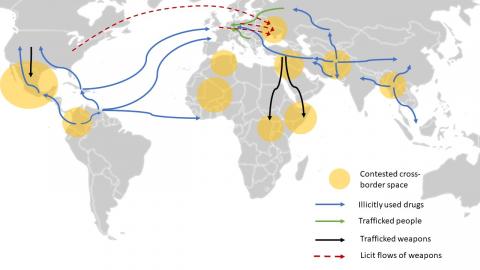Breadcrumb
What drives global security threats and how are they related to illicit flows and contested spaces?
Our research, part of the Global Security Programme based at Pembroke College, Oxford, seeks to illuminate the dynamic interactions of the political, economic, and social dimensions of global security: global order, transnational supply chains and local experiences of instability.
Networked illicit flows of weapons, drugs, money and trafficked people span contested cross-border spaces embedded in unstable regions. They can turn local security risks into a globally relevant phenomenon. We study how this mechanism works, and how it helps proliferate cross-border violence, strengthen armed actors and shift the global balance of power. We expect that, together, these intersecting dynamics undermine global security, influencing order in the contemporary world.
This project thus sheds light on a critical blind spot in national and global security thinking: contested cross-border spaces where armed state and non-state actors such as criminals, insurgents, and terrorists cooperate and compete in governing territory, economic transactions, and populations.
Bringing together the social sciences with complexity science, our interdisciplinary team based at the University of Oxford, Harvard University, George Washington University, George Mason University, University of Toronto, and Tufts University uses a multi-method nested analysis research design.
We work across different levels of analysis ranging from the local, and national, to the transnational and global level, with a particular focus on Ukraine/Russia, South Asia, the Middle East, the Horn of Africa, the Andean Region, and the Golden Triangle.
Research approach
Three features characterise our research approach:
- epistemologically, we combine a bottom-up, transnational borderland lens with complexity theory to provide original insights into security risks that can fuel national and global threats;
- analytically, we develop a “glocal” approach that integrates geospatially referenced data across multiple geographic scales into one comprehensive model;
- methodologically, we integrate data science with people-centred methodologies to obtain generalisable results.
The project is also part of the Global Security Programme based at Pembroke College, Oxford.
Impact
In partnership with the United Nations System Staff College and New America, we seek to provide entry points for policymakers to revert harmful governance dynamics in contested cross-border spaces, effectively disrupt global illicit supply chains by weakening central nodes, and tackle global security threats.
Support
We receive generous funding from the Minerva Research Initiative that supports social science research aimed at improving our basic understanding of security. The overall award amount is $28.7m and only 17 programmes were selected among 220 applicants. Oxford is the only non-US university.

People
Ashley Wright
Emilia Ziosi
Shuyang Song
Project Collaborators
Support
The project is part of the Global Security Programme at Pembroke College, Oxford, and supported by the Minerva Research Initiative.




















